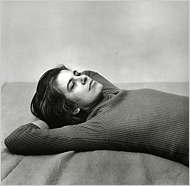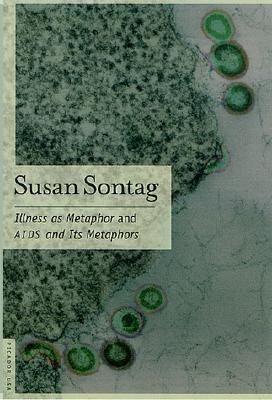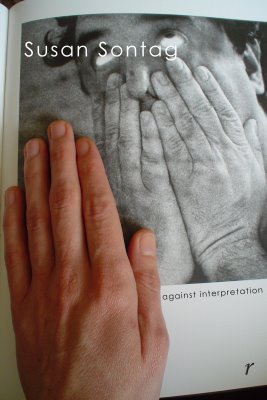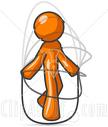Serendip is an independent site partnering with faculty at multiple colleges and universities around the world. Happy exploring!
Notes Towards Day 2: Alice in Bed with...?

Alice James abed |
 Susan Sontag abed |
|
|
|
I. coursekeeping
--how are we doing w/ posting in the commonplace book?
everyone on who's tried? any glitches to report/work on?
12 members/7 postings; anyone who hasn't tried yet?
let's look @ your postings, see how well this is working
does it work to call/re-name each individual blog a "page" in our class-wide "book"?
when you return there to do a second posting this week, be sure to date and title it...
sign up sheet: w/ your Serendip user-name, please
Leon Edel says in his introduction to Alice James's diary that she began
to keep a commonplace book after she moved to England, in 1886,
"filled w/ words of famous writers" that "seem to speak for Alice"
But in 1889 she announced that "she will henceforth deal with her life in her own words":
"I think that if I get into the habit of writing a bit about what happens, or rather doesn't happen, I may lose a little of the sense of loneliness and desolation which abides with me."
for Wednesday: read (around in) the first 1/2 -- 100 pp.--
of these words, since published as The Diary of Alice James
See also excerpts @ "A Woman in Conversation with Herself":
what was most striking to me, in my first reading a few years ago,
was this sense of doubleness, of a self watching her self...
important theme for a class which will lead into the work of her two older brothers,
the psychological novelist and the novelistic psychologist
I'll be very curious to learn what strikes you,
what you want to puzzle over in Alice's writing:
will it be the form (the genre of "life writing") itself
(and what instructions it gives us for reading it)?
will it be her (Irish) politics? her cfs. of England and the U.S.?
her psychology? her treatment of her illness (and death)?
her representation of self or others?
II. to lead us into this activity of response,
we have today the model of Sontag, watching James
 |
|
Anne: what is your metaphor for your mind?
Since much of this course
will be about how minds work,
let's go 'round and describe,
metaphorically, our experience of how our own minds work
(we'll be William's imaginative test cases!)

III. Sontag's play tells us as much about her mind as it does about Alice James' --
"All is fiction, of course, in my play. Much is invented."
--an invitation to all of us to do the same thing w/ this grand old family--
get to know them, live w/ them...then turn them to our own use
(watching Jane Campion's film, The Portrait of a Lady, this weekend:
she turned a psychological melodrama into a costume drama: yuck!)
For your first paper, you might want to think about
an imaginative response to Alice James:
what would happen if you got in bed w/ her?
whose thinking-or-living might be
interestingly combined w/ hers, as Sontag does?
who else might you put in bed w/ her?
[how about Judith Shakespeare, from
Virginia Woolf's essay, A Room of One's Own?]
So, what else, aside from her habits of mind,
does Sontag highlight in Alice James's story?
from this week's postings, what we saw her seeing-->
Cf. what HJSr. reported, in a letter to one of his sons, that he had told Alice
"she had my full permission to end her life whenever she pleased" w/
the passage aseidman flagged on p. 22 of Sontag's play:
"Why do you ask me. Could I stop you if you've really set your mind to it.
Your willful mind."--> or: she controls her own decisions
Edel interprets her "assertive and attention-getting inquiry" as
"a way of asserting her freedom"; she later told her father
"now she could perceive it to be her right to dispose of her own body
when life had become intolerable, she could never do it"
[Watch also for the multiple accounts in Alice's diary, of reported suicides.]
Per Sontag's own notes, "Alice" is Shakespeare's sister, become a career invalid,
from not knowing what to do w/ her genius, her originality, her aggressiveness-->
and so she = Alice in Wonderland, perplexed in the arbitrary world
reclusive Emily Dickinson, tragic Margaret Fuller join her mad tea party,
along Murtha and Kundry, "two exemplary angry women" from the 19th c. stage
turn @ end to demands of the world: history and poverty-->
highlighting the "bourgeois luxury of psychological invalidism."

The pattern Sontag traces in Illness as Metaphor (1978): various personality types have been associated, through history, with various diseases; those stories evaporate once a physical cause for the illness is identified.
[Alice in Bed, with the Young Man, p. 93:
"Are you ailin' or are you ... cracked .... You mean yer pretendin' ...."
"No, I'm really ill. I just like to make fun of myself."]
In that book, Sontag makes an argument AGAINST metaphorization, AGAINST interpretation, which she had already made 14 years before, in spades in “Against Interpretation” (1964):

[from the re-cover project]
What might this have to do with Alice in Bed (1993)??
How might it guide our reading and our responding?
Sontag says, in her notes, that this is...
"A play, then about the grief and anger of women;
and finally, a play about the imagination.
The reality of the mental prison. The triumphs of the imagination.
But the victories of the imagination are not enough."
What does that mean?
What more is needed?
Reading Notes
p. 7, Nurse: It is only a question of will power.
p. 21, Father: I'm so far inside the way my life turned out I can't see the edge.
p. 29, Harry: What is intelligence but a form, the form of intensity.
p. 39: "Her tragic health was in a manner the only solution for her of the problem of life."
p. 51, Margaret: "How inconvenient to be two people."
p. 54: "Unhappiness may be only a mistake. A mental mistake, that you could still undo...."
p. 62: "let all those hard griefs slither away like curds turned out of their dish."
p. 63, Alice: "we had all been educated by Father to feel that death was the only reality and that life was simply an experimental thing."
p. 65, Emily: "It's a question of scale. To me it was an adventure to cross the village lane."
p. 68, Margaret: "Want what you are capable of...and live according to it."
p. 70, Alice: "We have the most sisterly respect for your suffering."
p. 73, Margaret: "My husband was a boy ... I felt safe with him ... though he could not speculate about...anything."
p. 73, Emily: "How nice to be a frog!"
p. 76, Myrtha: "Just move, you'll discover. The strenght you don't know."
p. 77, Alice: "It's enough if you..kindle my imagination."
p. 80, Alice: "I can travel in my mind...I can have an overview."
p. 84, "remembered wrog, which is what remembering is."
..."in my mind. I can go as far as I want...the mind has its own swellings and diminishings.
[the child with the maimed hand?]
p. 88, Alice: "Don't be so conventional. Very few things are really impossible."
p. 102-3: "I see big things very small and small things so big .... I'm trapped inside this turbid self that suffers, that closes me in, that makes me small .... Out there it is so big .... It reverberates within me."
p. 104, Young Man: "Hardly human? An' what are you. You don't have to do nothin' but lie here. What's so human about that.
Bring your copy of the play back w/ you on Wednesday, along w/ the diary,
so we can do a little genre-comparison....



